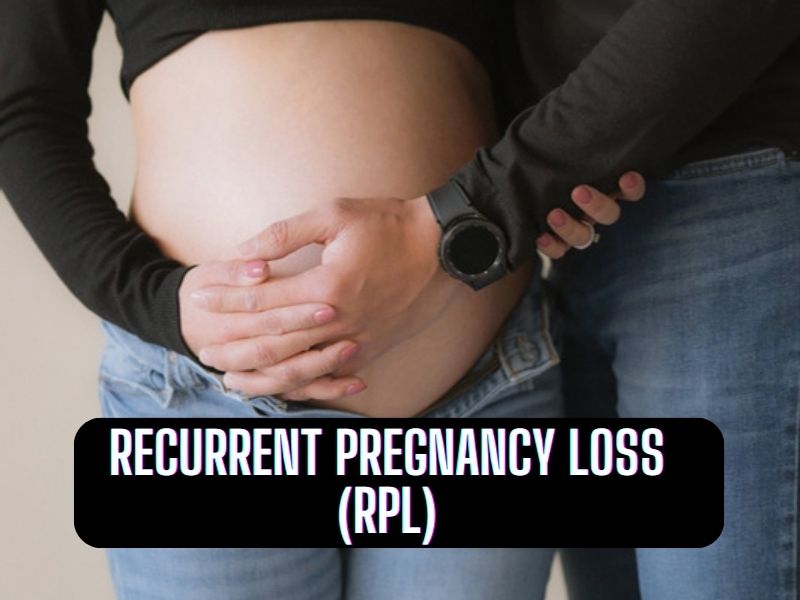
Recurrent pregnancy loss is a condition when a woman has 2 or more clinical pregnancy losses (miscarriages) before the pregnancies reach 20 weeks.
Common causes of RPL
There can be multiple reasons for recurrent pregnancy loss
Genetic/ Chromosomal abnormalities
Are the most common cause of early pregnancy loss. Chromosomal issues in either partner can lead to the fetus being unable to develop properly, resulting in miscarriage. Many miscarriages in the first 3 months of pregnancy are due to these genetic abnormalities in the fetus.
Normally, there are 46 chromosomes that contain the genes for normal development of a fetus but sometimes if there is an extra chromosome or missing chromosomes, early miscarriages can happen. For example, in Down syndrome there are 47 chromosomes. Chromosomal abnormalities are present in upto 60% of first-trimester pregnancy losses.
Genetic abnormalities typically do not allow development into a healthy baby. As women age, the miscarriage risk due to these genetic abnormalities increases — from 10%-15% in young women to more than 50% in women over 40 years old.
Anatomic / Uterine abnormalities
Problem with the shape of a woman’s uterus might be a cause for pregnancy loss. Structural problems in the uterus, such as fibroids, septum, or scarring, can interfere with implantation or the ability to carry a pregnancy to term.
Anatomic causes include having a band of tissue inside the uterus, called a septum. This can make the inside of the uterus too small. Women born with a septum may have more frequent miscarriages. Fibroids, benign muscle tumors of the uterus, are also common. These can lead to miscarriages if they grow into or near the uterine cavity.
Lifestyle/Environmental
Smoking increases the risk for RPL. Using certain recreational drugs, such as cocaine, can also lead to miscarriage. Being overweight has been linked with RPL as well as other pregnancy complications. Excessive alcohol or caffeine intake might be linked with RPL.
Medical conditions
Untreated medical conditions, such as thyroid disease or diabetes, and polycystic ovary syndrome (PCOS) can increase the risk for miscarriage. Abnormalities of the immune system (Immunological factors) or blood-clotting system (thrombophilia) can also cause RPL.
-
- Infections – infections like rubella or cytomegalovirus can also increase the risk of miscarriage
-
- Unexplained – In over half of RPL cases, doctors cannot find the cause for the recurrent pregnancy losses. However, many of these may be due to genetic abnormalities.
Tests to detect the cause of RPL
Blood tests can show if a woman has any medical, immune, or blood-clotting conditions that might be the cause for RPL.
The chromosomes of women and their male partners can be studied using a special blood test called a “karyotype.” Some healthy people have differences in the way their chromosomes are arranged. This can increase their risk for genetically imbalanced pregnancy losses.
A special x-ray (hysterosalpingogram) or ultrasound or MRI can show if a woman has a problem with the shape of her uterus or any anatomic abnormality.
Treatments available
Treatment for repeated pregnancy loss depends on the underlying cause:
With certain conditions, medical or surgical treatment can lower a woman’s risk for future miscarriage.
Chromosomal abnormalities: In cases where this is the cause, genetic counseling may be recommended. In some instances, assisted reproductive technologies like IVF with Pre-implantation genetic testing (PGT) can help screen for chromosomal abnormalities before implantation.
Uterine abnormalities: Surgical intervention may be necessary to correct structural issues in the uterus. This could involve removing fibroids or correcting a uterine septum.
Hormonal imbalances: Medications or lifestyle changes may be suggested to regulate hormones and improve fertility.
Immunological factors: Treatments to modulate the immune system may be considered, though this area of treatment is still under research and not universally accepted.
Infections or medical conditions: Treating underlying infections or managing pre-existing medical conditions can help reduce the risk of miscarriage.
It’s important to note that the appropriate treatment depends on the specific diagnosis made after a thorough evaluation by a healthcare professional, usually a reproductive endocrinologist or fertility specialist.
Each case is unique, and the treatment plan is tailored to the individual’s circumstances and underlying causes.
Even after having 3 miscarriages, a woman has a 60%-80% chance of conceiving and carrying a full- term pregnancy.
For couples seeking infertility treatment, Dr. Sonu Balhara is one of the most experienced IVF Doctor in Gurgaon, have totally understood that IVF is not just a treatment for you but it’s a ray of hope to be a future parent.
